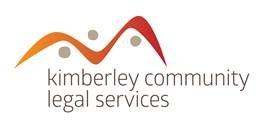Past Projects
KCLS tackles systemic problems in legal policy that affect our clients. You can find all of our submissions here.
Our past work for change includes:
Redress WA
The WA Government's Redress WA Scheme enabled people who were abused or neglected in State care before March 2006 to apply for redress. The Scheme was open for 12 months from 1 May 2008. Successful applicants were offered an ex-gratia payment of up to $45,000, counselling and an apology.
Aboriginal people in the Kimberley and across WA had no voice in the development of the Scheme. We obtained material under freedom of information laws which confirmed that there was no process for community input into the effectiveness of the Scheme.
Many of our clients did not receive any redress, because the Scheme closed before they heard about it. Based on our research, the Scheme appears to have been least effective for the most vulnerable: Aboriginal people with low literacy and limited access to information and assistance.
What did KCLS do?
We made submissions to the Royal Commission into Institutional Responses to Child Sexual Abuse about how institutions and governments should address past abuse, incorporating our clients' experiences of the failures of Redress WA.
In January 2015, we made submissions to the Royal Commission's Consultation Paper on Redress and Civil Litigation. We argued that:
There should be a legislated national Redress Scheme for survivors of institutional child sexual abuse;
Any Redress Scheme should be substantively fair, impartial and transparent, with decisions capable of being reviewed on the merits;
Redress should have at least three elements: a direct personal response by the institution, access to psychological care and monetary payments;
Collective redress is a necessary element of any future scheme;
Unless survivors are provided with culturally appropriate and sustained legal assistance, vulnerable claimants in the Kimberley will be effectively prevented from participating, and
There should be no limitation or closing date for survivors who wish to make a claim.
In June 2014, we made submissions in response to the Royal Commission's Issues Paper on Redress Schemes.
We reported on the experience for people and communities in our region of Redress WA and the WA Stolen Wages Reparation Scheme, two Redress Schemes set up by the WA Government in response to historical injustice.
Stolen Wages
Under the WA Government's Stolen Wages Reparation Scheme, Aboriginal people who met certain criteria and while living at a 'Government Native Welfare Settlement', had their income withheld and not repaid, were entitled to an ex-gratia payment of $2,000. The Scheme was open for less than nine months: from 6 March to 30 November 2012.
We talked to hundreds of Aboriginal people, many of whom believed strongly that the Scheme was unfair, because it:
failed to respond to the effects of Stolen Wages on Aboriginal people as a group, as families and as communities;
failed to allow Aboriginal families, communities and organisations to apply for funds for programs or projects, and
failed to assist non-Aboriginal people to understand and respond properly to the experience of those people whose wages were stolen.
What did KCLS do?
Working with our clients, we advocated for a new process to address the injustices of Stolen Wages in WA. Our work included:
preparing a petition signed by over 400 people from our region, protesting the WA Government's response to Stolen Wages. The petition was given to Robin Chapple, Greens MLC for the Mining and Pastoral Region, and tabled in the WA Legislative Council on 17 June 2014;
using Freedom of Information laws to obtain over 800 pages of material produced by the 2007-08 WA Stolen Wages Taskforce. This material indicated that the Taskforce recommended an overall payout of around $60 million under the Scheme. In fact, the Scheme paid out only $2,526,00, or less than 5% of this figure;
helping to publish an article in the Griffith Review, 'Finger Money: The black and white of Stolen Wages in Western Australia'. The article was a finalist in the United Nations Association of Australia Media Peace Awards 2015, and
assisting reporter Ginny Stein to prepare a story on Stolen Wages for ABC television's Lateline program.
Contaminated Land
From 2012 to 2015, the WA Government reviewed the Contaminated Sites Act 2003 (the Act). The Act regulates contaminated land in WA: land that has been polluted by landfills, service stations, power stations, asbestos and other sources.
What did KCLS do?
KCLS made submissions based on its experience helping public housing tenants with asbestos contamination at their properties. We argued that:
the duty to report contamination should be extended to any person with the professional knowledge to identify contamination at a site;
penalties for non-reporting should be more actively enforced, to increase compliance with the Act;
sites must be thoroughly investigated, and the necessary remedial work done, before they are re-classified as 'de-contaminated' or 'not contaminated';
tenants should be informed about and included in this process;
the government must clearly communicate what is required of tenants to meet their reporting responsibilities and ensure their safety, and
landlords should be required to disclose contamination to new or potential tenants, to promote transparency and enable better risk management.
Human Rights
From 2008 to 2009, the Australian Government conducted the National Human Rights Consultation. People across Australia were asked how they wanted their human rights protected.
What did KCLS do?
KCLS made submissions on the extent to which human rights are protected and promoted in the Kimberley. We submitted that:
currently, the rights of Indigenous people in the Kimberley are not adequately protected;
a federal Human Rights Act could make a difference in protecting and promoting the rights of Indigenous Australians in the Kimberley by requiring government and service providers to carefully consider how decisions affect human rights, and
human rights legislation should be coupled with a community awareness program that uses local organisations which have established relationships with community members.
